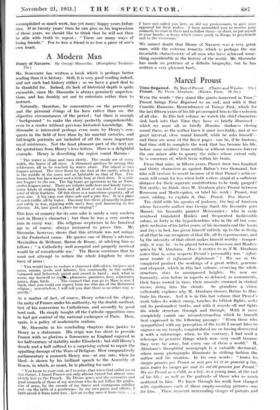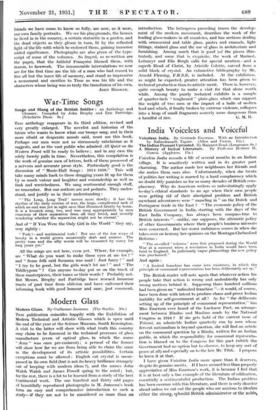Marcel Proust
Wrru the words " they stand like giants immersed in Time," Proust brings Time Regained to an end, and with it that Comedic Ilumaine, Remembrance of Things Past, which for the last fifteen years of his life preoccupied him to the exclusion of all else. In this last volume we watch the chief characters sink back into that Time they have so briefly illumined '- whichwe must all so briefly illumine—darkness closing round them, as the author knew it must inevitably, and at no great interval, close round himself, while he asks himself= and these are sonic of the finest pages—can he, if he hastens, find time still to complete the work that has become his life, before sonic accident frOm within or without removes forever the one miner able to quarry the riches whose extent only he is conscious of, which teem within his brain.
From that mine, in fifteen years, Proust drew two hundred and thirty characters as against Balzac's two thousand, !mit who will venture to assert because of it that Proust's achieve- ment will count for less when both writers stand at a sufficient distance for their separate contributions to be truly gauged? Not rashly, we think, does M. Abraham place Proust between Rousseau and 'Montesquieu, or label his work : Proust, tout court, adding, to explain it, Oni. Proust. Pas Marcel.
The child with his agonies of jealousy, the boy of fourteen whose favourite author was George Sand, his favourite poet Musset, his favourite painter Meissonnier ; who in early manhood translated Ruskin and frequented fashionable salons, at forty is the hypochondriac who in the all but com- plete reclusion of his latter years, of his insomnia and the hours and days in bed, has given himself entirely up to the re-living. of all that he can recapture of that life, all its repercussions, and by the intensity of that effort makes himself worthy—temper- arily, it may be—to be placed between Rousseau and Montes- quieu by M. Abraham. Does it matter to us if M. Abraham notes that 'in some respects Pmust's personality was " is/fin/- meat trouble et infiniment deplaisante" ? We see in the completed product the workings of a great writer, generous and eloquent, which in this last volume, crowning the whole structure, rises to unsurpassed heights. We now sec humanity, seen before in aspects so debased, as monuments, their bases rooted in time, their summits crowned in eternal
snows, rising into the clouds. So grandiose a vision sufficiently explains why M. Abraham chooses Balzac to
illus- trate his theme. And it is in this last volume that Proust's work takes its widest sweep, touches its loftiest flights, seeks out its profoundest truths, and with it rounds off and lights his whole structure through and through. With it must completely vanish one misunderstanding which he himself best expressed in the following passage : " Even those who sympathized with my perception of the truth I meant later to engrave on my temple, congratulated me on having discovered it with a microscope, when, to the contrary, I had used a telescope to perceive things which were very small because they were far away, but every one of them a world." M. Abraham's thoughtful monograph is a valuable document, whose many photographs illuminate in striking fashion the author and his creation. In his own words : " touter les images pewees par Proust ne sont pas id d ne peuvent y are, mais touter les images qui sont ici ont ele perishes par Proust." We see Proust as a child, as a boy, as a young man, at the end of his life ; as well as the portraits of those who so much mattered to him. We know through his work how charged with significance each of these empty-seeming pictures was for him. .....These innocent unrevealing visages of parents and friends we have come to know sa fully, are now, as it Were, our own family portraits. We see his playgrounds, the houses he lived in in the country, a certain statuette in a garden, and the dead objects as they gleam in turn, lit by the reflected light of the life with which he endowed them, gaining immense added significance. Photographs are also given of the type- script of some of the volumes. So frayed, so re-written are the page& that the faithful Frangoise likened them, with reason, to lacework. The innumerable intercalations we now see for the first time are the life of a man who had ceased to live all but the inner life of memory, and stand as impressive a monument and sacrifice to Time as was his life and the characters whose being was so truly the transfusion of his own.
JOHN RODKER.

































































 Previous page
Previous page